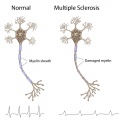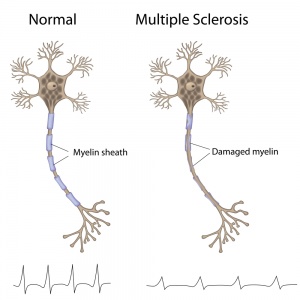Multiple Sclerosis
Multiple Sclerosis (MS) is an autoimmune disease affecting neurologic function which can result in a variety of symptoms including: muscle weakness, fatigue, numbness, movement abnormalities, changes in vision, and depression.[1] MS most commonly affects individuals between 20 and 50 years of age, and occuring at a rate between 1-2.5:1000 it is the most common cause of neurologic disability in this age group. [2]
|
Multiple Sclerosis | |
| Causes | Environmental Toxins, Smoking, Infections, Medical Interventions, Dietary Factors |
|---|---|
| See Also | Neurological Conditions |
| Books | Books on Neurological Conditions |
| Articles | Articles on Neurological Conditions |
Naturopathic Assessment
Causal Factors
In order to stimulate the innate ability of the body to heal the causes of disease must be identified and addressed. In the case of Multiple Sclerosis (MS), the causes are variable, with environmental factors playing a key role. A detailed assessment is required to determine which factors are contributing to disease development and progression.
Lifestyle
| Article | Horse-assisted Therapy Appears to Improve Balance in People With Multiple Sclerosis , 2010 December Natural Medicine [1] |
|---|
- There is growing evidence that increased consumption of animal fats, animal protein, and meat from non-marine animals increases the risk of MS.[3], [4]
- MS may be associated with a disturbance in the Omega-6 fatty acid (linoleic acid) metabolism. This disturbance of n-6 fatty acid metabolism may give rise to a loss of membrane long chain n-6 fatty acids and loss of the anti-inflammatory regulatory cytokine TGF-beta, particularly during the relapse phase, as well as loss of these important neural fatty acids for CNS structure and function and consequent long term neurological deficit.[5]
- Diets high in vegetables, fruit, vegetable protein, dietary fiber, vitamin C, thiamine, riboflavin, calcium, potassium, and fish seemed to have a modest influence on decreasing MS risk.[1]
Social
Environmental
- Geography
- There is a correlation between increased incidence of MS and distance from the equator. Factors implicated in this relationship include genetic predisposition by population group, regional dietary factors, and vitamin D levels. [2]
- Areas of lower temperatures and precipitation are associated with increased occurrence.[3]
- Infectious pathogen has long been considered central to the disease process of MS. A variety of infectious agents have been evaluated with herpes virus 6, chlamydia pneumoniae, and Epstein-Barr virus being the pathogens receiving the most attention.[2], [6]
- A parasitic infection may actually be correlated with a reduced number of exacerbations and altered immune reactivity in multiple sclerosis (MS).[7] Because helminths (parasites) are powerful modulators of host immunity, some authors hypothesize that reduced parasite exposure due to improved hygiene conditions may favor MS development.[8]
- There is growing concern that a link between Environmental Toxins and MS including EMF radiation exposure, lead and other heavy metals, air pollution and environmental chemicals.
| Article | Sex Hormone Treatments for Multiple SclerosisJ Orthomolecular Med 2012;Vol27(2) |
|---|
Medical Interventions
- Medical Procedures
- Although controversial, a link between use of mercury fillings and MS has been identified in some studies.[9]
- There is some evidence that immunity to tetanus is protective against MS,[10] yet the hepatitis B vaccination may actually induce demyelinating disease and increase the risk of MS.[11]
- Adjuvants, found in vaccines, are strong immunostimulants and may be harmful for those with multiple sclerosis.[12]
Genetics
- Race
- Race plays a significant role in determining MS risk. Individuals of Caucasian and African descent have higher risk factors than those of Asian descent.
- Having a sibling or parent with MS increases risk five to ten times. It is estimated that there are 10-15 individual genes influencing risk of acquiring MS.[1]
Diagnostic Testing
Multiple Sclerosis is diagnosed through neurologic examination and various special tests including:[1] [2]
- Head CT or MRI to identify the presence of demyelination.
- Eclectrophysiologic tests refered to as evoked potentials are used to assess visual, auditory, and sensory pathways.
- CSF testing for immunological changes.
Characteristics
The development of MS involves inflammation, injury of axons, and demyelination. Demyelination affects the ability of neurons to transmit impulses, and thus results in weakness, numbness, vision impairment, and movement difficulties. It is postulated that the processes leading to the development of MS is initiated by injury to the CNS via viral, bacterial, toxin mediated, or traumatic means. After the insult a physiological immune response occurs, and if this response malfunctions neuronal damage may occur.[2]
Multiple Sclerosis can be categorized into four groups:[2]
- Relapsing and remitting MS - refers to disease progression in which individuals experience acute flare ups of symptoms followed by remissions. This occurs in approximately 80% of cases.
- Secondary Progressive Phase MS - refers to more marked deterioration with less frequent acute attacks of symptoms. This usually occurs within 10 years of onset of disease, and occurs in 50-80% of individuals with relapsing and remitting MS.
- Primary Progressive MS- involves steady deterioration from onset of disease without relapses, and occurs in 10-15% of patients.
- Progressive Relapsing MS- occurs when patients experiencing primary progressive MS also have some relapses along with progressive deterioration. It occurs in 6% of patients with primary progressive MS.
Common Symptoms
Multiple sclerosis typically follows a remitting relapsing pattern. The symptoms for each individual are varied based on parts of the CNS that are affected including:[1]
- muscle weakness, stiffness and/or tingling in lower limbs
- incontinence, urinary urgency
- sexual dysfunction
- blurred vision, blindness, double vision
- Loss of balance
- Memory impairment
- Difficulty concentrating
- Fatigue
- Heat sensitivity
- Depression and mood disorders
Naturopathic Treatment
| Article | Multiple sclerosis: Integrative management strategies, IHP, [2], June/July 2010 |
|---|
The goal of naturopathic treatment is to support and work in tandem with the healing power of the body and to address the causal factors of disease with individual treatment strategies. MS is a chronic disease and treatment needs to be long term, integrated, and individually designed to fit each person. It is always advisable to work with a naturopathic doctor before engaging in any treatment plan.
Home Care
Home Care strategies include: Individuals with MS may require significant homecare based on disease progression. Issues with bowel and bladder incontinence are common, and home care strategies to address these issues are important to put in place.
Lifestyle
Lifestyle recommendations include:
| Article | Considering multiple sclerosis, psychoneuroimmunology, and mind-body medicine, Vital Link; 2008 Winter/Spring |
|---|
- A diet with less than 5% of total calories from saturated fat, and less than 1% trans fat.
- Increase dietary omega-3 essential fatty acids.
- Reduce or eliminate dietary gluten (may be helpful to test for transglutaminase and gliadin antibodies before instituting this diet)
- Eliminate alcohol. [1]
- Ensure you drink adequate water.
- Depression is very common in individuals with MS, and it is recommended that appropriate counselling, stress reduction, relaxation, and breathing exercises are integrated into daily life.[2]
- Stress reduction techniques including deep breathing exercise, meditation, and yoga should be utilized in the treatment of MS.[1]
- Before implementing an exercise program for an individual with MS it is important to complete a physical assessment. Exercises designed to activate working muscles without overloading are recommended. Commonly used exercise prescriptions include:[2]
- Aquatics. Water provides support for individuals with impaired balance problems and aids in movements they cannot complete out of water
- Yoga, Qi Gong or similar exercises can improve balance, circulation, relaxation, flexibility, and reduce muscle tension.
- Pilates movements generally focus on core muscles which are normally unaffected even in severe MS, and helps to emphasize coordinated deep breathing.
Naturopathic Therapies
The prescribing of naturopathic therapies requires the guidance of a naturopathic doctor as it depends on a number of factors including the causal factors, a person's age, prescription medications, other conditions and symptoms and overall health. It is always advisable to work with a naturopathic doctor prior to taking any natural therapies.
| Article | Efficacy of Vitamin B3 and its related Coenzymes for the Treatment of Bell's Palsy, Huntington's Disease, Migrain and Chronic Tension-Type Headaches, Multiple Sclerosis, Parkinson Disease, and Tinnitus J Orthomolecular Med 2012;Vol27(2) |
|---|
Naturopathic Therapies for Multiple Sclerosis include:
- Clinical Nutritional Supplementation includes
- Vitamins such as: Vitamin B1 or Thiamine, vitamin D, vitamin B12, vitamin B3.
- Minerals such as: calcium, magnesium, selenium
- Amino Acids such as: N-acetyl-cysteine, threonine
- Other supplements such as: Green Tea, Phosphatidylserine, Myelin sheath extract, Cod liver oil , Alpha-Lipoic Acid [13][1], Melatonin
- Herbs such as Withania or Ashwaganda (Withania somnifera), Ginkgo (Gingko biloba), St. John's Wort (Hypericum perforatum).[1]
- Gemmotherapies such as Malus sylvestris
- Homeopathy remedies such as Aconite, Arsenic, Avena sativa, Cimicifuga, Cocculus, Colocynthis, Kalmia, Nux vomica Phosphoric acid, Ranunculus, Sepia, Silica, Spigelia, Zinc [14]
- Traditional Chinese Medicine & Acupuncture recognizes the complexity and diversity in symptomology of MS, and treatment may include the following principles based on individual presentation:[15]
- Resolve dampness, tonify the spleen and invigorate the connecting channels.
- Tonify kidneys and liver and strengthen bones and tendons.
- Physical Medicine. Research suggests that use of neuromuscular stimulation can assist in the reduction of muscle spasms, muscle pain, and disuse atrophy seen commonly in MS patients.[16]
Specialized Naturopathic Therapies
Specialized therapies that are used to treat MS include:
- Hormone therapy including estriol, testosterone, and Dehydroepiandrosterone have shown benefit in treatment of MS. [2]
- IV administration of Glutathione has been shown to be an effective antioxidant treatment, and due to the well-established role of oxidative damage in MS, glutathione is commonly used as treatment.[1]
References
Reviewed by Iva Lloyd, BScH, RPE, ND [3]
- ↑ 1.00 1.01 1.02 1.03 1.04 1.05 1.06 1.07 1.08 1.09 1.10 Pizzorno Joseph E, Murray Michael T (2006) Textbook of Natural Medicine 3rd ed Elsevier.
- ↑ 2.0 2.1 2.2 2.3 2.4 2.5 2.6 2.7 2.8 Rakel D (2007) Integrative Medicine 2nd ed. Saunders.
- ↑ 3.0 3.1 Lauer K, Firnhaber W (Aug 1992) Epidemiologic aspects of multiple sclerosis Versicherungsmedizin.;44(4):125-30. PMID: 1509645.
- ↑ Ben-Shlomo Y, Davey Smith G, Marmot MG (1992) Dietary fat in the epidemiology of multiple sclerosis: has the situation been adequately assessed? Neuroepidemiology.;11(4-6):214-25. PMID: 1291885.
- ↑ Harbige LS, Sharief MK (Oct 2007) Polyunsaturated fatty acids in the pathogenesis and treatment of multiple sclerosis. Br J Nutr.;98 Suppl 1:S46-53. PMID: 17922959
- ↑ Pawate S, Sriram S (Apr 2010) The role of infections in the pathogenesis and course of multiple sclerosis. Ann Indian Acad Neurol.;13(2):80-6. PMID: 20814489.
- ↑ Correale J, Farez MF (Apr 2011) The impact of parasite infections on the course of multiple sclerosis. J Neuroimmunol.;233(1-2):6-11. PMID: 21277637.
- ↑ Correale J, Farez MF (Oct 2011) The impact of environmental infections (parasites) on MS activity. Mult Scler.;17(10):1162-9. PMID: 21980148
- ↑ Huggins HA, Levy TL. (1998) Cerebrospinal fluid changes in multiple sclerosis after dental amalgam removal. Alt Med Rev;3:295-300
- ↑ Verstraeten T et al. (2005) Immunity to tetanus is protective against the development of multiple sclerosis. Med Hypotheses;65:966-69
- ↑ Faure E. (2005) Multiple sclerosis and hepatitis B vaccination: Could minute contamination of the vaccine by partial hepatitis B virus polymerase play a role through molecular mimicry? Med Hypotheses;65;509-520
- ↑ Oztürk S (Jul 2010) Swine flu vaccine adjuvants and multiple sclerosis - Is there potential for harmful effect? Med Hypotheses.;75(1):50-2. PMID: 20171793.
- ↑ Prousky Jonathan (2008) Principles and Practices of Naturopathic Clinical Nutrition CCNM Press.
- ↑ Hershoff Asa (2000) Homeopathic Remedies, A Quick and Easy Guide to Common Disorders and their Homeopathic Treatments, Avery Publishing Group, New York
- ↑ Maciocia G (1994) The Practice of Chinese Medicine: The Treatment of Diseases with Acupuncture and Chinese Herbs. Churchill Livingstone
- ↑ Wahls et al. (2010) Rehabilitation with Neuromuscular Electrical Stimulation Leads to Functional Gains in Ambulation in Patients with Secondary Progressive and Primary Progressive Multiple Sclerosis: A Case Series Report. Alt Comp Med;16(12);1343-49.

